Vacation in Wyoming
I’m on vacation this week in Jackson, Wyoming, one of the most beautiful spots in America; a real slice of the Wild West! I’ll be back next Sunday night!
I’m on vacation this week in Jackson, Wyoming, one of the most beautiful spots in America; a real slice of the Wild West! I’ll be back next Sunday night!

The World Federation of Hemophilia Congress was a wonderful time, and very informative. Representatives from all over the world came to Buenos Aires, Argentina, all last week, to share news, present studies and network.
One of the most talked about subjects was not gene therapy, but longer acting factor. As we mentioned in the February issue of PEN (https://www.kelleycom.com/newsletter.html) it looks like extended half-life factor will be next on the horizon for new products. Of all the companies presenting, Biogen Idec perhaps stole the show. The company reported positive results from a Phase I/IIa safety and pharmacokinetic study of its recombinant factor IX protein, called “rFIXFc,” in hemophilia B patients. The primary objective of the study was to assess safety, and the product was well tolerated (albeit in a single-dose) with no signs of inhibitor development or antibodies.
Chief medical officer of hemophilia products at Biogen Idec, is none other than Glenn Pierce, twice president of the National Hemophilia Foundation. As president of NHF a long time ago, Glenn pushed hard for gene therapy and was hopeful that it would be found in ten years, and then dampened that hope to in our lifetime. For now, it seems we may have found the next best thing: long acting factor.
The Congress gave me a chance to meet with a variety of colleagues from around the world, including those from Pakistan, Honduras, Tanzania, Ghana, India, Belize and New Zealand, just to name a few! Nice break for me: instead of traveling to meet them all in their countries over several years, I was able to meet with them all in one week!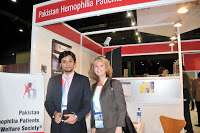
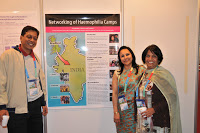
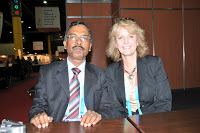
Great Book I Just Read
The Man Who Tried to Save the World by Scott Anderson
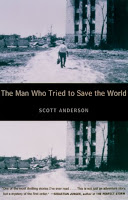
This book gets better each time I read it. The enthralling story of larger-than-life Texan Fred Cuny, the “Master of Disaster,” who disappeared in Chechnya in 1995. Anderson actually travels there during wartime (dubbed one of the scariest places on earth) to learn what happened to Cuny. Cuny was a visionary, who turned the international disaster relief world on its head with his revolutionary–and effective–ways of approaching disaster relief. Largely self-taught, his compassion, passion and “bedrock practicality” led him to devise better and cheaper ways to save lives–not always a welcome thing to the comfy and bloated big international nonprofits. He was drawn to danger and this book reads like a spy thriller and a fascinating biography of a fascinating American. He is a true American hero. Harrison Ford bought the rights to the movie in 2002: come on Ford, where is the movie? Three stars.
I’m in Argentina all week at the World Federation of Hemophilia Congress, where an estimated 4,200 people have congregated to share information about hemophilia and to network. It’s been great to meet old friends (some going back 20 years now!) and to meet new friends. It’s actually mind-boggling how many people are here, all concerned about hemophilia from all corners of the earth.
Two of the first people I bumped into were Lynley and Richard Scott from New Zealand. I feel like I know them well as–you will see soon–they have contributed many stories of son Andrew for my new inhibitor book. We chatted today for about 5 straight hours as we hung out (while the rest of the convention seemed glued to the big screens to watch the World Cup), and then went out to dinner together. Argentina is beef capital of the world and has some of the best beef–but I don’t eat red meat! Well, their flan is great too!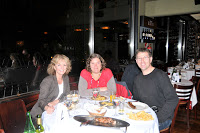 ‘
‘
It was a great pleasure to see one young leader, Masood, from Pakistan, who has truly blossomed to a national position. I met him last in 2007 in Lahore, Pakistan. He has hemophilia, and excellent skills that should help his country move forward in care.
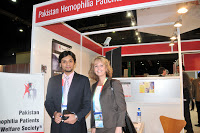
The topics for presentations range from the practical–how to help children cope, physiotherapy and health care delivery–to the possible, including many discussions on longer acting factor and new products.
One thing I learned that has really made me happy: Ghana and Tanzania should be inducted as members of the World Federation of Hemophilia. These are two countries I have been advising for the past 5 years each to help them establish hemophilia societies. At long last, their hard work will be paid off by becoming members. Being an official member means that they will be eligible for many more resources from the community, such as training, factor donations and potentially twinning.
I still have a few more days to go and hope to learn lots more to share. ¡Hasta luego!
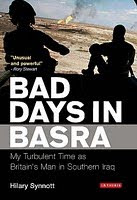
My friend Richard Atwood keeps finding the most interesting news items in hemophilia. His latest: A British soldier with hemophilia serving in Iraq.
In Bad Days in Basra: My Turbulent Time as Britain’s Man in Southern Iraq, Hilary Synnott, 58, was only weeks away from an early retirement after a career spanning 11 years in the Royal Navy and 30 years in the Diplomatic Service, half of which occurred in developing countries with large Muslim populations.
Then he was asked to be the senior civilian representative in southern Iraq. Synnott agreed to a 6 month tour as head of the Coalition Provisional Authority for the South, based in Basra, in an area holding 4.5 million Iraqis on a quarter of the country’s land mass, and hosting 11,000 British military personnel. The goal of the CPA was to establish a secure, peaceful, and democratic Iraq, but he described the situation as “a bloody mess.”
Funny he should call it that. Synnott underwent a customary medical check which revealed he had mild hemophilia. After another medical check at St. Thomas’s Hospital in London (right next to Big Ben), Synnott commented, “… the doctors provided me with a special medication kit and a supply of needles intended to clot the blood in the event of injury. It was all contained in an insulated plastic bag, to keep the medication cool. I was told to keep the whole lot in a fridge and to learn how to administer the potions myself since the accompanying instructions would be too complicated for non-specialists to follow in a hurry.” Synnott took the factor with him to Basra: “The bag stayed at the bottom of a cupboard, to emerge six months later covered in sand.”
It’s surprising that his hemophilia had not been diagnosed while he served on submarines in the Royal Navy. With regret, Synnott evaluated the civilian contributions as a disappointing failure because it was an impossible situation for a myriad of reasons. The author currently serves as a Senior Fellow at the International Institute for Strategic Studies, and this book sounds like a good read!
Good Book I Just Read
The Red Pony by John Steinbeck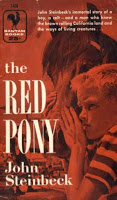
Another good read is this classic. I last read it in high school, and mindful of the high school summer reading list for my daughter, I chose to dust this one off and read it again. I was struck by the very simplistic language, and paucity of creative phrases. Very simple writing, in short sentences, but a poignant story. It’s a marvel how much emotion is betrayed through the simple style. There is also lots of foreshadowing. The story follows Jody, a ten-year-old boy, who receives a red pony as a gift from his emotionally-withdrawn and stern father, and from his warm farm-hand Billy Buck. It’s a sad story, but one you can relate to if you have ever lost a pet. There are also three more short stories about Jody and his family: all portray the simplicity of farm life in dry and hot mid-20th century California, but the complexity in family life, and depths of a child’s mind and heart. Three stars.
Would you like to be added to our email list to continue to recieve future editions of PEN in PDF format?
Yes: No:
Please share your location to continue.
Check our help guide for more info.

